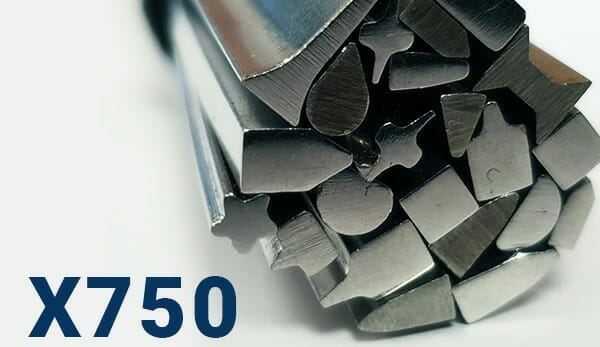Alloy X-750 displays excellent workability, including machinability and welding.

A menudo referido como Inconel® Alloy X-750, this high-performance austenitic nickel-chromium alloy is made precipitation-hardenable by the addition of aluminum and titanium. It has good resistance to corrosion and oxidation along with high tensile and creep-rupture properties at high temperatures. For extended applications that require high strength at high temperatures, Alloy X-750 may require a solution treatment, with air cooling between intermediate and final aging.
Alloy X-750 has excellent relaxation resistance, good elevated temperature strength properties to 1300ºF (700°C), and oxidation resistance to 1800ºF (983˚C). Lastly, Alloy X-750 is resistant to a wide variety of industrial corrosives under both oxidizing and reducing conditions, while also displaying excellent resistance to chloride stress corrosion cracking in fully age-hardened conditions.
Composición X-750
| C | Minnesota | Si | S | cr | Ni | Cb (Nb) | ti | Alabama | Fe | Co | Ejército de reserva | cobre | |
|---|---|---|---|---|---|---|---|---|---|---|---|---|---|
| mínimo | 14.0 | 70.0 | 0.70 | 2.25 | 0.40 | 5.0 | |||||||
| máx. | 0.08 | 1.00 | 0.50 | 0.01 | 17.0 | 1.20 | 2.75 | 1.00 | 9.0 | 1.0 | 0.05 | 0.50 |
El uso comercial de la aleación se rige por estándares industriales como: AMS 5698, AMS 5699, NACE MR0175 (ISO 15156‐3), NACE MR0103 (ISO 17945), ASTM B637, MIL‐DTL‐24493.
El uso aeroespacial se proporciona a través de AMS 5678G, que controla aún más el material con pruebas de calificación adicionales en la microestructura final del cable trefilado.
Se ha informado que la resistencia SCC de Inconel X-750 se puede mejorar por envejecimiento directo en el régimen de precipitación de 704°C a 8710°C. Por lo tanto, los cambios microestructurales que ocurren cuando Inconel X-750 se trata térmicamente entre 7040 °C y 8710 °C durante un máximo de 200 horas después de un recocido de solución de 2 horas a 10750 °C, 11490 °C o 12040 °C ha sido estudió. La cinética de engrosamiento del crecimiento de partículas γ' obedeció la predicción de la ley del tiempo de la teoría de Lipshitz-Slazor-Wagner de crecimiento controlado por difusión a todas las temperaturas de envejecimiento. El precipitado γ' perdió coherencia por la nucleación de bucles de dislocación dentro del precipitado, la interacción de la dislocación en la interfase y la atracción de las dislocaciones de la matriz a la interfase partícula/matriz.
Con la excelente resistencia a la relajación de la aleación X-750, es útil para aplicaciones como resortes y pernos de alta temperatura. La aleación X-750 se usa comúnmente en:
- Turbinas de gas
- Inversores de empuje
- Ruedas
- Conductos
- Discos
- Estructuras de Aeronaves
- Motores de cohetes
- Reactores nucleares
- Accesorios de tratamiento térmico
- Recipientes criogénicos
- Manantiales criogénicos
- Sujetadores criogénicos
- Válvulas de escape
- Recipientes a Presión Industriales
- Estampación
Comuníquese con un representante de ventas de CWI para obtener más información sobre esta aleación especial y cómo se puede aplicar a su industria.
Opciones de embalaje
- Bobina
- Carretes
- Barras
- Embalaje personalizado disponible
